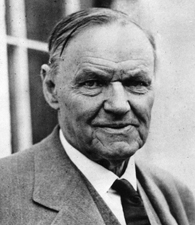Clarence Darrow participated in many controversial and highly publicized trials, tirelessly defending the underdog and fighting for civil rights. Never afraid to speak his mind, he made his ideas about agnosticism, liberalism, humanism and freedom of thought known to the world.
Clarence Darrow’s Early Days
Clarence Seward Darrow was born on April 18, 1857, in Kinsman, Ohio. His father had trained as a minister, but had lost his faith and become an agnostic. His mother, who died when Clarence was only 15, was a fierce supporter of women’s rights. His parents’ influence instilled in him a religious skepticism and a love of reading that would remain with him throughout his life.
Darrow studied at Allegheny College and the University of Michigan Law School, and became a member of the Ohio bar in 1878. In 1890, Darrow became the general attorney for the Chicago and North Western Railway. In spite of his good position and salary, he strongly believed that the criminal system in the United States favored the rich over the poor, and yearned to amend this injustice.
In 1894, he quit his job in order to defend the workers of the Pullman Company, who had gone on strike. Darrow’s continued defense of strikers, trade union leaders and anarchists earned him a reputation as a labor and criminal lawyer.
Sources in this Story
- Encyclopedia.com (UXL Encyclopedia of World Biography): Clarence Darrow
- PBS: American Experience: Monkey Trial
- University of Missouri-Kansas City Law School: Who is Clarence Darrow?
- The New York Times: Clarence Darrow Is Dead in Chicago
Darrow’s Notable Accomplishments
In 1912, Darrow took on the defense of two labor leaders who had been charged with murder in the dynamiting of the Los Angeles Times building. The trial was extremely controversial, and almost ended his career. Darrow himself came under attack and was accused of bribing the jury.
Darrow was likely guilty, according to University of Missouri-Kansas City law professor Douglas Linder, but he managed to beat the charges. Linder writes, “The country lawyer has some big city-fixer in him; the deck, he thinks, is stacked against defendants, prosecutors cheat, neither death nor prison is a proper punishment. Ends matter more than means to Darrow.”
The trial and bribery charge was a turning point in his career. According to biographer Kevin Tierney, “He was devastated…From then on he never got any employment from organized labor. His career as a union lawyer came to an end and he became a criminal defense lawyer.”
By the 1920s, Darrow was one of the most famous trial attorneys in the country. In 1924, he took on the Leopold-Loeb murder case and managed to save his clients from the death penalty.
In 1925, he defended biology teacher John Scopes against a Tennessee anti-evolution law that made it illegal “to teach any theory that denies the story of the Divine Creation of man as taught in the Bible, and to teach instead that man has descended from a lower order of animals.”
The high point of the trial was the debate between Darrow and creationist William Jennings Bryan, a politician whose political career Darrow had supported, but whose religious and scientific beliefs he opposed. Although Darrow technically lost the case and Scopes was convicted and fined $100 for what the court believed to be a crime, Darrow’s defense attracted national attention and led many to question their interpretations of the Bible.
The Scopes trial provided inspiration for the play “Inherit the Wind” in 1955. The character of Henry Drummond was based on Darrow. The play became a feature film in 1960, starring Spencer Tracy as Drummond.
The Man and His Work
- “The Story Of My Life” by Clarence Darrow
- “Clarence Darrow: Crime, Its Cause and Treatment” by Clarence Darrow
- “Infidels and Heretics an Agnostic’s Anthology” by Clarence Darrow, Wallace Rice
The Rest of the Story
Darrow continued to participate in highly publicized trials well into his 70s. In his later years, he concentrated on the intellectual aspects of law and religion, recording his ideas in his books: “Crime, Its Cause and Treatment” (1922) and “Infidels and Heretics” (1929). In 1932, Darrow also wrote an autobiography entitled “The Story of My Life.”
As his last public service role, Darrow became chairman of a government commission that examined the operation of the National Recovery Administration, an agency that regulated industry competition and workers’ hours and wages.
Darrow died on March 13, 1938, at age 80 due to heart disease. Throughout his career, he gained international fame as a labor lawyer and a criminal lawyer. According to his obituary in The New York Times, “He had built up a reputation for himself as a friend of labor and of the downtrodden. His oratory and his philosophy made him known to millions.”
This article was originally written by Anita Gutierrez-Folch; it was updated March 10, 2017.











